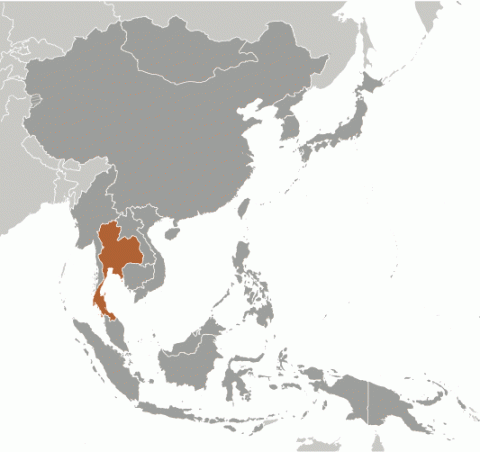Child Labor and Forced Labor Reports
Thailand


Significant Advancement
In 2024, Thailand made significant advancement in efforts to eliminate the worst forms of child labor. The Royal Thai Government passed Ministerial Regulation No. 15 to raise the age of domestic work to age 15, in alignment with international standards. It also passed a resolution that opens an accelerated pathway to citizenship for 477,000 stateless persons, including 142,000 children, facilitating greater access to education and economic stability and mitigating the worst forms of child labor among the population most susceptible to it. Further, the government conducted labor inspections in both formal and informal sectors and targeted 115 high-violation industries, including sectors identified by the United States in its List of Goods Produced with Child Labor, Forced Labor, and Forced Child Labor. In addition, it developed guidelines for businesses to improve working conditions, including the prevention of child labor, and as of 2024, 418 garment companies had implemented the guidelines. Moreover, prosecutions of child trafficking cases increased by nearly 10 percent, from 114 cases in 2023 to 125 cases in 2024. However, despite these efforts, there remains a lack of available research and data on whether unannounced inspections are conducted and how many child labor penalties have been imposed. In addition, Thailand’s hazardous work list does not include sectors in which child labor is known to occur, including paid participation in Muay Thai, in which there is evidence that children are exposed to physical dangers.
| Children | Age | Percent and Population |
|---|---|---|
| Working | 5 to 14 | 13.0% (1,302,267) |
| Hazardous Work by Children | 15 to 17 | Unavailable |
| Attending School | 5 to 14 | 96.3% |
| Combining Work and School | 7 to 14 | 14.4% |
| Sector/Industry | Activity |
|---|---|
| Agriculture | Working on farms, including animal farms, and planting and harvesting sugarcane; and working in fisheries and on sea vessels.† |
| Industry | Working in manufacturing, including garment production, and engaged in construction. |
| Services | Domestic work; restaurants; motor vehicle repair shops; gas stations; street work, including begging and vending; and Muay Thai fighting. |
| Categorical Worst Forms of Child Labor‡ | Commercial sexual exploitation, including in the production of pornography, sometimes as a result of human trafficking. Forced labor in vending, begging, and domestic work. Used in the production and trafficking of drugs, including narcotics. |
† Determined by national law or regulation as hazardous and, as such, relevant to Article 3(d) of ILO C. 182.
‡ Child labor understood as the worst forms of child labor per se under Article 3(a)–(c) of ILO C. 182.
Children at Higher Risk
Increased movement between Burma and Thailand due to the ongoing Burma military situation resulted in increased numbers of underage children engaging in child labor. Children coming from Burma are at higher risk of being exploited by recruitment agencies that falsify ages on official documents, resulting in children working while underage. In addition, an increased number of children are reported to be exploited in forced labor and forced criminality in Chinese-owned online scamming operations in neighboring countries. Thai children, as well as children from Burma, Laos, and Cambodia, are also subjected to commercial sexual exploitation in Thai massage parlors, bars, karaoke lounges, hotels, and private residences. In addition, children are being coerced into producing pornography and performing sexual acts through online social media platforms and private chat rooms, although the prevalence of such abuse has decreased significantly in recent years.
Barriers to Education Access
While Thai law provides for 12 years of free education for all children, language barriers prevent some non-Thai speaking children from accessing basic education as public school instruction and school applications are only available in Thai. Furthermore, although Thai law does not require that children provide identity documents or a registered address for school enrollment, research found that some schools request documentation of non-Thai students, which may prevent their access to education. Some communities have formed unofficial educational learning centers to provide children with native-language education or assist children who have had difficulty enrolling in or accessing Thai schools. However, most learning centers lack accreditation.
| Standard | Age | Meets International Standards | Legislation |
|---|---|---|---|
| Minimum Age for Work | 15 | ✓ | Sections 5, 44, and 148/1 of the Labor Protection Act; Ministerial Regulation No. 15 on Domestic Work |
| Minimum Age for Hazardous Work | 18 | ✓ | Sections 22, 47, 49, 50, 144, and 148/2 of the Labor Protection Act; Sections 26 and 78 of the Child Protection Act; Sections 20 and 45 of the Home Workers Protection Act; Section 56/1 of the Anti-Trafficking in Persons Act |
| Identification of Hazardous Occupations or Activities Prohibited for Children | ✓ | Chapter 4, Sections 49 and 50 of the Labor Protection Act; Clause 4 of the Ministerial Regulation concerning Labor Protection in Sea Fishery Work; Clause 2 of the Ministerial Regulation Identifying Tasks that may be Hazardous to the Health and Safety of Pregnant Women or Children Under the Age of Fifteen Years | |
| Prohibition of Slavery, Debt Bondage, and Forced Labor | ✓ | Sections 312 and 312 bis of the Penal Code; Section 6, 8, 52, and 53 of the Anti-Trafficking in Persons Act | |
| Prohibition of Child Trafficking | ✓ | Sections 282, 283, and 285 of the Penal Code; Sections 4 and 6 of the Anti-Trafficking in Persons Act (No. 3) | |
| Prohibition of Commercial Sexual Exploitation of Children | ✓ | Sections 8 and 9 of the Prevention and Suppression of Prostitution Act; Sections 4, 6, 6/1, 52 and 53 of the Anti-Trafficking in Persons Act; Sections 4 and 8 of the Royal Decree Amendments of the Anti-Trafficking in Persons Act; Sections 282, 283, 285, and 286 of the Penal Code; Sections 4, 26, and 78 of the Child Protection Act; Amendment to Section 84 of the Penal Code | |
| Prohibition of Using Children in Illicit Activities | ✓ | Sections 4 and 26(5) of the Child Protection Act; Sections 93 and 93/2 of the Narcotics Act; Section 84 of the Penal Code; Section 22 of the Beggar Control Act | |
| Minimum Age for Voluntary State Military Recruitment | 18 | ✓ | Section 12(3) of the Territorial Defense Volunteer Corps Act |
| Prohibition of Compulsory Recruitment of Children by (State) Military | ✓ | Section 16 of the Military Service Act | |
| Prohibition of Military Recruitment by Non-state Armed Groups | ✗ | ||
| Compulsory Education Age | 16 | ✓ | Section 17 of the National Education Act |
| Free Public Education | ✓ | Section 10 of the National Education Act; Section 54 of the Thai Constitution |
The minimum age for work is lower than the compulsory education age and, as a result, some children may leave school before the completion of compulsory education. Moreover, although Thailand has identified fishing on sea vessels as a form of hazardous labor—and research indicates that there is inadequate oversight of fishing vessels—the government implemented an amendment in 2022 to the Ministerial Regulation on Protection of Fishery Work 2014, which allows owners of fishing boats to employ a relative as young as age 16 as an intern. The law does not prohibit the paid participation of children in Muay Thai, in which there is evidence that children who are participating for financial benefits are exposed to physical injury. In 2024, the Royal Thai Government passed a regulation that would extend a variety of labor protections to household domestic workers, including protections against child labor. Under the regulation, households cannot employ children under age 15 to perform domestic work.
| Organization/Agency | Role & Activities |
|---|
| Department of Labor Protection and Welfare (DLPW): Enforces child labor laws through workplace inspections. Operates Hotline 1506 and 1546, a phone number that the public can use to make labor abuse complaints. Staffs DLPW offices in each province in Thailand to answer questions about working conditions and receive child labor complaints from the public. Reports indicate that some labor inspectors intentionally overlook instances of child labor among children from other countries due to fear of reprisal from business owners and local politicians and authorities. In 2024, DLPW reported providing information about the Labor Protection Act to a total of 16,122 inquiries and receiving 3,195 written complaints regarding non-compliance with that law. |
| Royal Thai Police: Operate the Anti-Trafficking in Persons Division (ATPD); the Thailand Internet Crimes Against Children Task Force (TICAC); and the Child Women Protection, Anti-Human Trafficking, and Fishery Industry Center (CWP). ATPD enforces laws related to forced labor, human trafficking, child pornography, and commercial sexual exploitation of children, and operates Hotline 1191 to receive complaints on human trafficking and violence against children. TICAC investigates and enforces laws against child trafficking and online commercial sexual exploitation of children, including the distribution and production of child pornography. During the reporting period, the Royal Thai Police investigated 9 tips concerning internet crime, leading to the identification of 14 suspects and the protection of 1 victim. They also supported the prosecution of 91 cases of the production or distribution of child sexual abuse material and 162 cases of child sexual abuse. Moreover, the Royal Thai Police investigated 283 cases of the worst forms of child labor, involving a total of 365 child victims, including 317 girls and 48 boys. |
| Overview of Enforcement Efforts | 2024 |
|---|---|
| Has a Labor Inspectorate | Yes |
| Able to Assess Civil Penalties | Yes |
| Routinely Conducted Worksite Inspections | Yes |
| Unannounced Inspections Permitted | Yes |
| Has a Complaint Mechanism | Yes |
| Imposed Penalties for Child Labor Violations | Yes |
| Conducted Criminal Investigations for Worst Forms of Child Labor Crimes | Yes |
| Imposed Penalties for Worst Forms of Child Labor Crimes | Yes |
In 2024, 2,856 labor inspectors conducted 28,029 worksite inspections, with 19 child labor violations found. There were 283 investigations into suspected cases of the worst forms of child labor, and 216 prosecutions were initiated. The number of perpetrators convicted is unknown.
| Coordinating Body | Role & Activities |
|---|
| National Committee to Eliminate the Worst Forms of Child Labor: Coordinates the implementation of child labor policies, facilitates cooperation among relevant ministries, and reports annually to the Thai Cabinet on child labor issues. Responsible for monitoring the National Policy and Plan to Eliminate the Worst Forms of Child Labor. Chaired by the Minister of Labor, with the Permanent Secretary of Labor and the Director-General of the DLPW serving as members and the secretary. It includes senior executives from government agencies, private sector representatives, employers’ organizations, employee organizations, NGOs, and relevant academics. On December 11, 2024, the government approved the revival of the National Committee after the cabinet term expired earlier in the year, and the government expects that it will continue the initiatives begun by its predecessor and maintained on an ad hoc basis. |
| Policy | Description & Activities |
|---|
| Fourth Action Plan for the Elimination of the Worst Forms of Child Labor (2023–2027): Seeks to operationalize an integrated, cooperative approach to eliminate the worst forms of child labor in Thailand, with five supporting sub-action plans focused on the following: (1) preventing all forms of child labor and providing public communication; (2) ensuring strong legal frameworks and effective enforcement; (3) providing assistance, protection, and rehabilitation to the victims of the worst forms of child labor; (4) promoting cooperation among government agencies in preventing and eliminating the worst forms of child labor; and (5) developing an administration, monitoring, and evaluation system for the action plan. During the reporting year, developed labor inspection forms, trauma-informed interviewing guidelines, and standardized operating procedures. |
| Cyber Tipline Remote Access Policy: Seeks to eliminate online sexual exploitation of children in Thailand by partnering with the U.S. National Center for Missing and Exploited Children (NCMEC). Supports TICAC by permitting the Royal Thai Police to request warrants to search residences and electronic equipment for child pornography and initiate criminal prosecutions. In 2024, conducted investigations in partnership with NCMEC, resulting in the provision of assistance to 212 child victims of online exploitation. |
| Good Labor Practices National Strategic Plan (2018–2037):* Seeks to improve labor standards in farming, animal husbandry, forestry, salt farming, and non-sea fisheries that involve seasonal or non-industrial work. The government entered memoranda of understanding with two large agro-industrial conglomerates, Mitr Phol Group and CPF Thailand, to expand their implementation of good labor practices to eliminate child labor, forced labor, and labor trafficking across their supply chains. |
* Policy was approved during the reporting period.
† The government had other policies that may have addressed child labor issues or had an impact on child labor.
| Program | Description & Activities |
|---|
| Centers to Promote Child Advocacy and for Victims of Trafficking:‡ Non-governmental- and government-operated learning centers provide basic education, life skills training, and vocational training to children in communities along Thailand’s borders. In 2024, the government reported that 63 registered learning centers serving 18,534 students were in operation in Tak Province, and that there were 793 learning centers operating nationwide. In addition, an Educational Coordination Center was created to improve access to education for children from other countries, support increased coordination of learning centers, and develop the capacity of teachers in learning centers. Learning centers remained active during the reporting year with an increase in demand with recent arrivals from Burma, though six centers were shut down in September 2024. |
| Programs to Address the Commercial Sexual Exploitation of Children:‡ The Ministry of Tourism and Sports leads the Child Friendly Tourism project with 21 government agencies, private sector organizations, and NGOs to develop measures to prevent and reduce commercial sexual exploitation of children in the tourism industry. Moreover, the Thailand Safe Internet Coalition, a partnership led by the Ministry of Social Development and Human Security (MSDHS), UNICEF, and Thai telecommunications companies and internet service providers, was formed to strengthen reporting of online abuse, enhance coordination, improve service provision for survivors, and increase awareness of children, young people, and parents regarding online risks. During the reporting period, the program held 5 training sessions, with 863 participants. The Good Labor Management Practices on Child-Safe Friendly Tourism guidelines have been implemented in 285 tourism businesses, involving 12,990 employees. These guidelines prevent child labor and exploitation in accommodations like hotels and guesthouses, with a focus on safeguarding interns, students, and guests. |
| MSDHS Programs:‡ Implements anti-trafficking projects through ATPD. Oversees Hotline 1300, which receives human trafficking and child labor complaints. Operates 7,189 child protection community centers, which assisted children facing various disadvantages and risks of exploitation, as well as 77 child and family shelters and 108 childcare centers, which provided shelter, basic necessities, and services to poor children and families. Provides assistance and welfare protection to survivors of human trafficking. In 2024, the Department of Children and Youth, within MSDHS, received questions and complaints related to human trafficking, child exploitation, and child welfare as follows: (a) the Child Protection Information System received 17,481 queries through contact with a government official and 44 queries through its mobile application; (b) the 1300 hotline received 1,380 queries; and (c) the ESS Help Me channel on the Line messaging application received 1,527 cases. Moreover, in 2024 MSDHS provided intervention and support to a total of 309 child victims of human trafficking. Services included physical and mental healthcare, trauma-informed rehabilitation, education, social welfare, reintegration assistance, and placement in human trafficking shelters. Also administered income support programs provided up to approximately $90 (3,000 Thai baht) in monthly assistance to 59,639 poor families. |
‡ Program is funded by the Government of Thailand.
† The government had other social programs that may have included the goal of eliminating or preventing child labor.
| Area | Suggested Action |
|---|---|
| Legal Framework | Criminally prohibit the recruitment of children under age 18 by non-state armed groups. |
| Raise the minimum age for work from age 15 to age 16 to align with the compulsory education age. | |
| Update hazardous occupations and activities that are prohibited for children to include sectors in which child labor is known to occur, including paid participation in Muay Thai, in which there is evidence that children are exposed to physical dangers. | |
| Enforcement | Conduct unannounced inspections at remote workplaces, including in agriculture and domestic work, and ensure that inspections occur without interference from business owners, local politicians, or authorities. |
| Provide interpretation services that enable labor inspectors to meaningfully interview foreign workers and ensure independence of the labor inspectorate from outside interests. | |
| Ensure that fishing vessels employing children under age 18 to work as apprentices are fully complying with the protections required in the Ministerial Regulation on Protection of Fishery Work to prevent the increased risk of child labor for apprentices. | |
| Fully implement the National Referral Mechanism and provide training for officials and multidisciplinary teams, including at the local levels. | |
| Social Programs | Improve access to education by clarifying to school officials the necessary documents for non-Thai students to submit for enrollment, raising awareness of all children's right to education, and increasing language and instructional support for non-Thai speakers. |
| Conduct child labor prevalence surveys to ensure that there are sufficient social programs to address exploitation of children in the agriculture, garment manufacturing, domestic work, and construction sectors. | |
| Provide sufficient funding for social programs to assist children from vulnerable groups who face barriers to education and are at high risk of child labor. |












